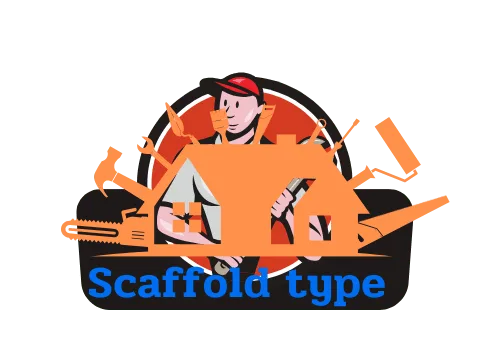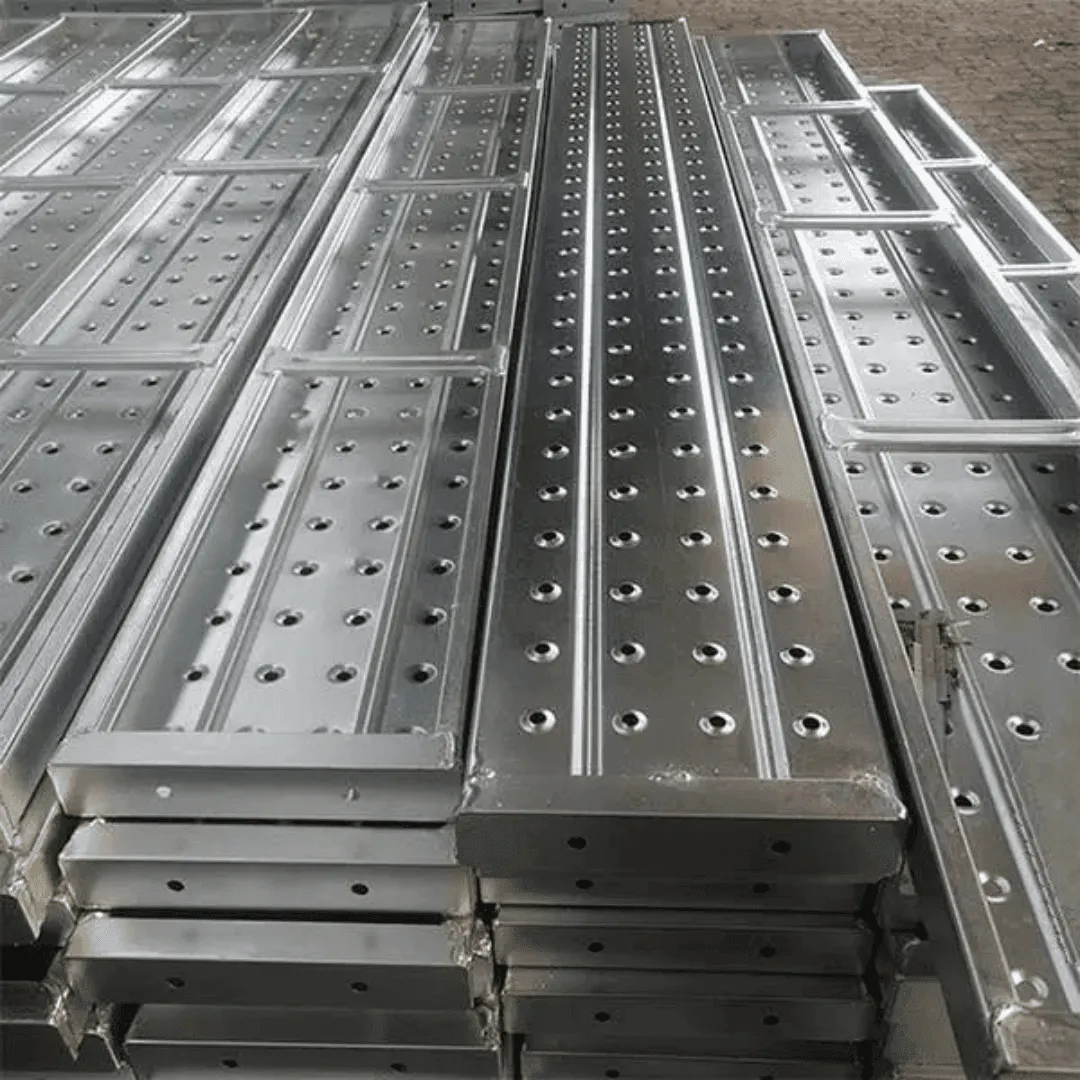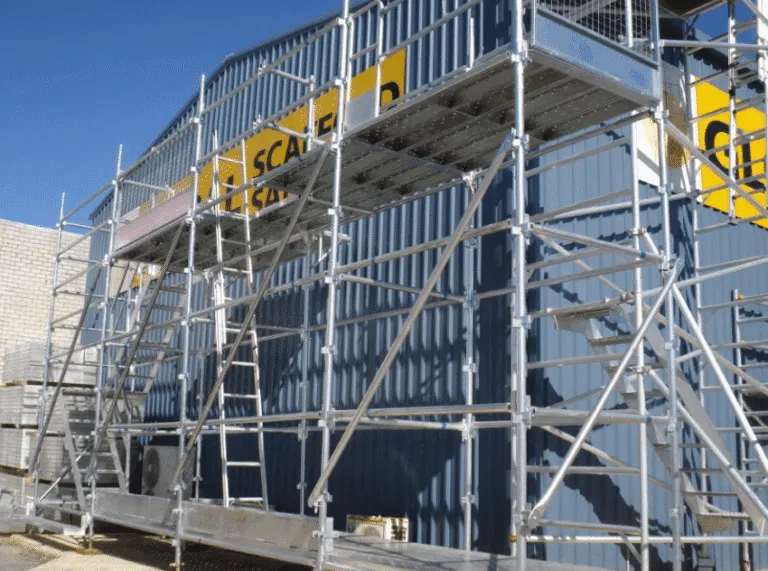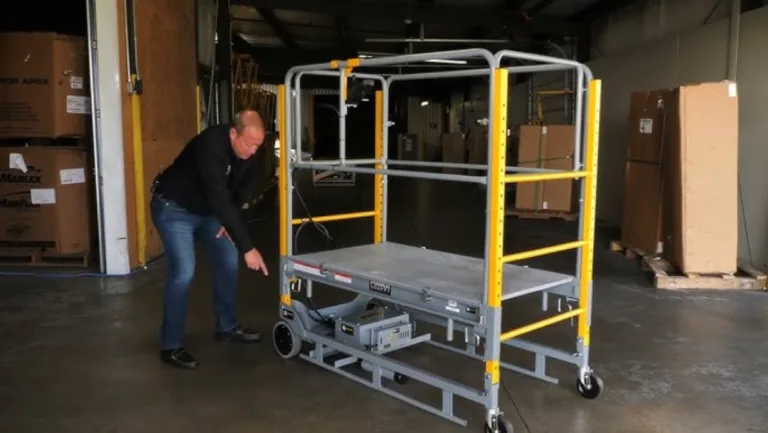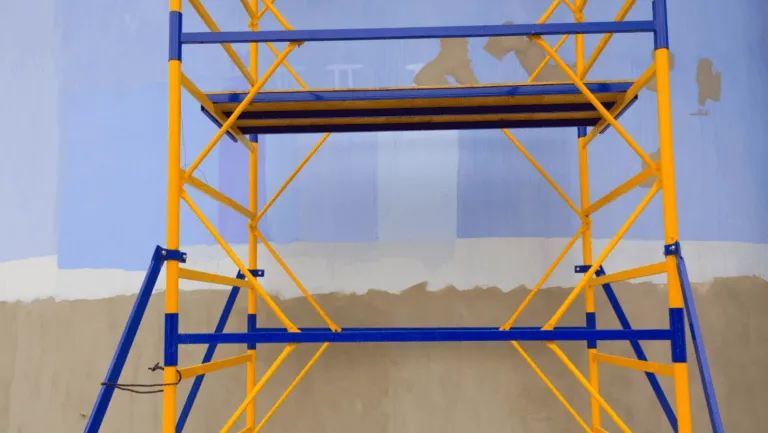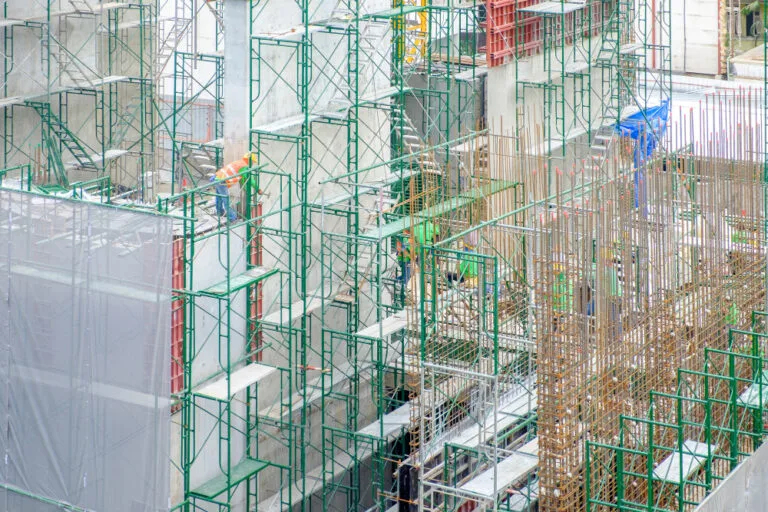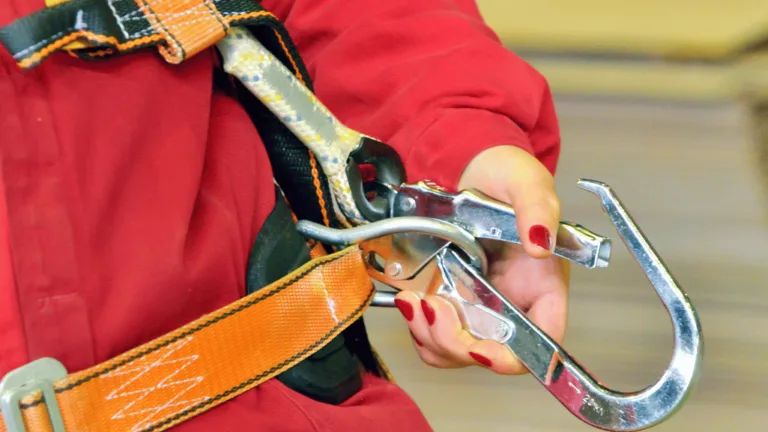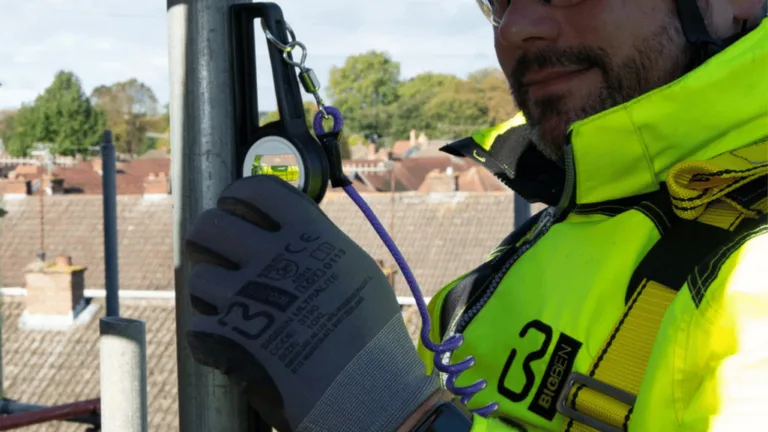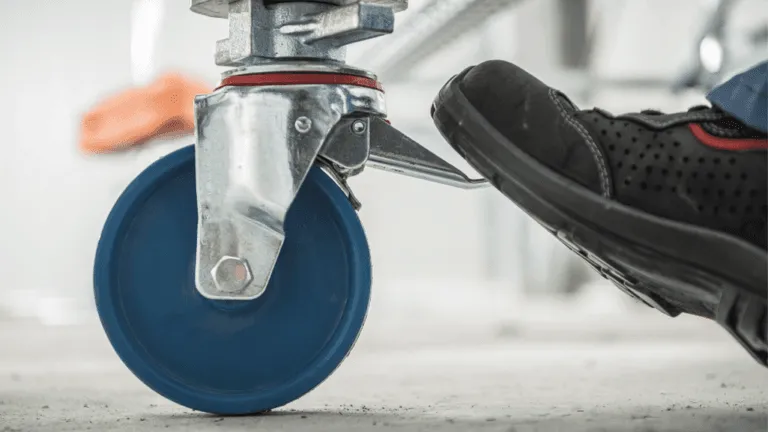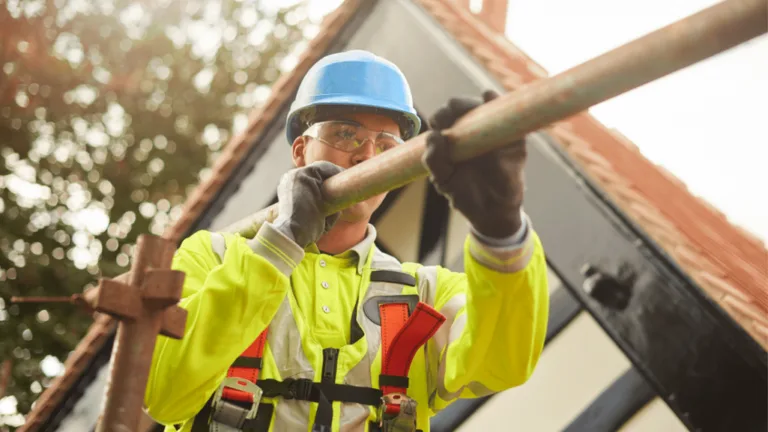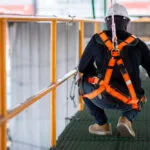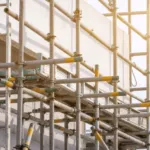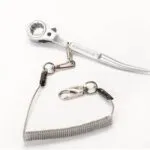Phone:
(+65)8319-0742
Scaffold planks, also known as scaffolding boards or wooden planks, are essential components in construction projects. They provide secure and robust support for workers, equipment, and materials. These planks need to meet strict safety and quality standards to ensure the integrity of the scaffold structure.
Key Takeaways:
- Scaffold planks are crucial for secure construction.
- They provide strong support for workers and materials.
- Planks must meet safety and quality standards.
- Different types of planks are available, including wooden, metal, and composite.
- Regular inspection and maintenance are essential for safety.
Understanding Scaffold Planks and Their Importance in Construction
Scaffold planks serve as the foundational element for temporary structures in various construction projects – from routine maintenance and repairs to large-scale building endeavors. These planks play a pivotal role in providing a stable and secure surface for workers to perform tasks at different heights, optimizing workflow efficiency. By understanding the significance of scaffold planks, we can ensure safe and successful construction projects.
Scaffold planks are available in a range of materials, with each material offering distinct advantages and considerations. The three main types of scaffold planks commonly used are:
1. Wooden Planks:
Wooden scaffold planks, typically made from high-quality hardwood like pine or fir, are widely accessible, affordable, and easy to handle. They boast impressive strength and can withstand heavy loads, making them an excellent choice for many construction applications.
2. Metal Planks:
Metal scaffold planks, often crafted from steel or aluminum, provide remarkable durability, weather resistance, and exceptional strength. These planks are known for their longevity and are particularly suitable for projects that require robust and long-lasting support.
3. Composite Planks:
Composite scaffold planks are a blend of materials, usually combining the strength of metal with the affordability and versatility of wood. Made with advanced materials like fiberglass or carbon fiber, composite planks are lightweight, non-conductive, and resistant to damage, making them an attractive choice for construction projects that require optimal strength and flexibility.
Understanding the different types of scaffold planks and their characteristics allows construction professionals to select the most suitable option for their specific project requirements. Whether it’s wooden, metal, or composite planks, ensuring their quality and compliance with safety regulations is crucial for a secure and effective construction process.
Types of Scaffold Planks and their Features
When it comes to scaffold planks, there are several options available, each with its own unique features and benefits. Whether you’re working on a construction site or setting up a temporary platform, it’s important to choose the right type of plank for the job. In this section, we’ll explore wooden planks, metal planks, and composite planks, highlighting the characteristics and applications of each.
Wooden Planks
Wooden scaffold planks are a popular choice in the construction industry. Typically made from high-quality hardwood like pine or fir, these planks offer accessibility, affordability, and ease of handling. Wooden planks are lightweight yet sturdy, making them suitable for various construction tasks. They provide a reliable and comfortable platform for workers to navigate at different heights. With proper maintenance and regular inspection, wooden planks can last for a long time, ensuring a durable scaffold structure.
Metal Planks
Metal scaffold planks, typically made of steel or aluminum, are known for their exceptional strength, weather resistance, and durability. These planks can withstand heavy loads and harsh environmental conditions, making them ideal for demanding construction projects. Metal planks are less susceptible to rot, corrosion, and warping, offering long-term reliability. Additionally, the non-combustible nature of metal planks adds an extra layer of safety, especially in environments where fire hazards are a concern.
Composite Planks
Composite scaffold planks combine the advantages of both wood and metal. These planks are made by combining a wooden core with an outer layer of metal, such as steel or aluminum. By doing so, composite planks offer the strength and durability of metal planks, along with the affordability and accessibility of wooden planks. Furthermore, composite planks are non-conductive, lightweight, and resistant to damage, making them suitable for electrically sensitive areas and reducing the risk of injury due to heavy lifting.
Each type of scaffold plank has its own set of features and applications, allowing builders and construction professionals to choose the most suitable option for their specific needs. Whether it’s wooden planks for a cost-effective solution, metal planks for heavy-duty projects, or composite planks for a combination of strength and affordability, the choice ultimately depends on the requirements of the project and the desired level of performance.
Safety Considerations for Scaffold Planks
Ensuring the safety of workers is paramount when using scaffold planks. The integrity of scaffold structures depends on the quality and proper installation of these planks. Here are some essential safety considerations:
- Regular inspection and maintenance: Scaffold planks should be regularly inspected for any signs of damage, such as cracks, splits, or corrosion. Faulty planks should be immediately replaced to prevent accidents and ensure worker safety.
- Adhering to load capacity: It is crucial to follow the recommended load capacity for scaffold planks. Overloading them can lead to structural failures and endanger workers. Always consult the manufacturer’s guidelines for the specific load capacity of the planks being used.
- Proper installation: Scaffold planks must be securely fastened and leveled to avoid tripping and slipping hazards. The planks should be installed with proper supports, such as scaffolding brackets or other approved methods, to ensure stability and prevent accidents.
- Fall protection: Fall protection measures should be in place when working at heights using scaffold planks. This includes the use of guardrails, safety nets, or personal protective equipment like harnesses and lanyards. Adhering to fall protection guidelines helps prevent serious injuries and fatalities.
By following these safety considerations, construction companies can create a safer working environment and minimize the risk of accidents and injuries.
“Safety is not an option; it’s a necessity. Prioritizing safety when working with scaffold planks ensures the well-being of workers and the successful completion of construction projects.”
Sample Scaffold Plank Inspection Checklist
| Item | Inspection Criteria | Action Required |
|---|---|---|
| Scaffold Plank | Check for cracks, splits, or damage | Replace if damaged |
| Load Capacity Label | Ensure load capacity is legible and intact | Replace if illegible or missing |
| Secure Fastening | Check if planks are properly secured | Re-fasten if loose |
| Level Support | Ensure the planks are level | Adjust support if necessary |
Regular inspections using checklists like the one above help identify potential safety hazards and ensure that scaffold planks are in proper working condition.
Recent Developments in Scaffold Planks

The scaffolding industry has undergone significant advancements in recent years, leading to improvements in the manufacturing and installation of scaffold planks. These developments have revolutionized the construction industry by enhancing safety, efficiency, and sustainability.
Prefabrication
An exciting development in scaffold plank production is the adoption of prefabrication techniques. Prefabricated scaffold planks are manufactured off-site in controlled environments, allowing for better quality control and consistency. This process ensures that every plank meets stringent safety and performance standards.
Modular Systems
Modular scaffold systems have gained popularity due to their flexibility and ease of customization. These systems allow for quick assembly and disassembly, enabling construction teams to adapt scaffolds to various project requirements. By using modular scaffold planks, workers can efficiently create secure platforms at different heights.
Advanced Materials
The use of advanced materials in scaffold plank production has significantly improved their strength, durability, and sustainability. Composites, such as fiberglass-reinforced plastics, carbon fiber, and aluminum, provide enhanced structural integrity while reducing weight. This leads to easier handling and reduced risk of worker fatigue. Additionally, these materials are resistant to corrosion and decay, prolonging the lifespan of scaffold planks.
Digitalization
Digital technologies have revolutionized scaffold plank monitoring and maintenance. Sensors embedded within the planks can detect structural weaknesses, temperature changes, and excessive loads. Combined with IoT platforms, this data allows for real-time monitoring, enabling proactive maintenance and preventing structural failures. By leveraging digitalization, construction professionals can ensure the safety and longevity of scaffold plank systems.
Green Scaffolding
The push for sustainability in construction has led to the development of green scaffolding practices. These practices promote resource efficiency, waste reduction, and environmental preservation. Scaffold planks made from recycled materials and utilizing energy-efficient manufacturing processes help minimize the carbon footprint of construction projects. Green scaffolding also encourages the integration of sustainable practices, such as renewable energy sources and water-saving measures.
Image illustrating eco-friendly practices in the construction industry.
Benefits of Werner Scaffold Planks and Accessories
When it comes to scaffold planks and accessories, Werner is a name you can trust. With their wide range of products, including walk planks, guard rails, plank ties, and brackets, Werner offers everything you need to complete your scaffolding system.
One of the key advantages of choosing Werner scaffold planks is their exceptional quality. Whether you opt for aluminum planks or a more budget-friendly option, you can be confident that Werner products are built to high standards and meet all necessary safety requirements.
By investing in Werner scaffold planks, you can enjoy the following benefits:
- Reliability: Werner has a long-standing reputation for manufacturing durable and reliable scaffold planks that withstand the rigors of construction sites.
- Versatility: With a variety of planks and accessories available, you can customize your scaffolding system to meet the specific requirements of your project.
- Safety: Werner scaffold planks are designed with safety in mind, ensuring stability and a secure working platform for construction workers.
- Durability: Made from high-quality materials, such as aluminum, Werner scaffold planks are built to last, providing long-term value for your investment.
Associated Scaffolding is a trusted resource for all your scaffolding needs. They offer a comprehensive range of Werner scaffold planks and accessories at affordable prices. Additionally, they provide customized branding options, allowing you to showcase your company logo and enhance your professional image.
So, whether you’re looking for top-notch scaffold planks or other essential accessories, Werner and Associated Scaffolding have you covered.
Renting Scaffold Planks

When it comes to temporary projects, renting scaffold planks can be a cost-effective solution. Associated Scaffolding, a reliable industry leader, offers scaffold plank rentals at their convenient store locations. Whether you’re in Raleigh, Durham, Greensboro, Charlotte NC, Columbia SC, Knoxville TN, or Richmond VA, you can easily access a wide selection of scaffold planks to meet your specific project needs.
Associated Scaffolding understands the importance of quality and safety in construction. That’s why they stock OSHA-rated wooden scaffold planks, as well as durable aluminum and steel planks in various lengths. This ensures that you have access to reliable and secure scaffold planks for your temporary construction projects.
| Associated Scaffolding Store Locations |
|---|
| Raleigh |
| Durham |
| Greensboro |
| Charlotte NC |
| Columbia SC |
| Knoxville TN |
| Richmond VA |
By renting scaffold planks from Associated Scaffolding, you can optimize your budget without compromising on safety and quality. Their team of experts is ready to assist you in choosing the right scaffold planks for your project, ensuring that you have the necessary support for successful construction.
Take advantage of Associated Scaffolding’s rental services and experience the convenience of renting scaffold planks from a trusted industry leader. Let them help you make your temporary construction projects a success.
Werner Warehouse Pick-Up Locations
If you’re in need of Werner scaffold planks and other construction products, you’ll be pleased to know that Werner offers convenient pick-up locations across various states. Whether you’re in Atlanta, Georgia; Houston or El Paso, Texas; Merced, California; Chicago, Illinois; or Wilkes-Barre, Pennsylvania, you can easily collect your Werner products at a local warehouse. Take advantage of these accessible pick-up locations to get the high-quality scaffold planks you require for your construction projects.
By offering pick-up locations in multiple states, Werner ensures that customers can conveniently access their scaffold planks and other products. Avoid the hassle of shipping or waiting for delivery â simply visit your nearest Werner warehouse and quickly get the materials you need. These pick-up locations are strategically located to serve different regions, making it easier for construction professionals to acquire the sturdy scaffold planks required for their projects.
Associated Scaffolding, a trusted provider of construction equipment and supplies, partners with Werner to offer a wide selection of scaffold planks and accessories. From walk planks to guard rails, their comprehensive range of products ensures you’ll find everything you need for a complete scaffolding system. With Associated Scaffolding’s commitment to affordable pricing and optional customized branding, you can rely on them as your go-to resource for Werner scaffold planks and more.
Optimal and Safe Work with Scaffold Planks

To ensure optimal and safe work with scaffold planks, it is important to follow guidelines and safety tips. By prioritizing safety measures, accidents can be prevented, and a secure working environment can be maintained.
Regular Inspection
Regular inspection of scaffold planks is essential to identify any signs of wear, damage, or defects. Inspect the planks for cracks, splintering, warping, or any other signs of deterioration. If any issues are found, replace the damaged planks immediately to ensure the structural integrity of the scaffold.
Adherence to Load Capacity
Always adhere to the recommended load capacity of the scaffold planks. Overloading the planks can lead to structural failure and accidents. Be aware of the weight of workers, equipment, and materials and distribute the load evenly across the scaffold. If the load capacity is unknown or uncertain, consult the manufacturer or a qualified professional for guidance.
Secure Installation
Proper installation of scaffold planks is crucial for a safe working environment. Securely fasten the planks to the scaffold frames using appropriate fasteners or brackets. Ensure that the planks are level and tightly secured, minimizing the risk of tripping or slipping hazards. Proper installation also includes ensuring that the scaffold structure is stable and secure.
Fall Protection Measures
Implementing fall protection measures is essential when working at heights on scaffold planks. Install guardrails, toeboards, and midrails around the scaffold to prevent falls. Use personal protective equipment, such as harnesses and lanyards, when required. Train workers on proper fall protection techniques and ensure awareness of potential hazards.
Consideration of Weather Conditions
Weather conditions can significantly impact the safety of working on scaffold planks. Strong winds, rain, snow, or icy conditions can pose risks and affect the stability of the scaffold. Before starting work, assess the weather conditions and take appropriate safety measures, such as securing the scaffold or postponing work if necessary.
Remember, safety should always be the top priority when working with scaffold planks. Following guidelines and safety tips minimizes the risk of accidents and promotes a secure working environment.
Implementing these safety tips and guidelines ensures the optimal and safe use of scaffold planks, protecting workers and promoting efficient construction practices.
Conclusion
In conclusion, scaffold planks are essential components in construction projects, providing secure and robust support for workers. By understanding the different types of scaffold planks, considering safety considerations, and staying updated on recent developments in the industry, construction professionals can optimize the use of these critical elements.
Werner scaffold planks and accessories offer high-quality options that meet safety standards, ensuring the reliability of scaffold structures. Whether you need wooden planks, metal planks, or composite planks, Werner has a wide selection to suit your needs.
Renting scaffold planks from Associated Scaffolding can be a cost-effective solution for temporary projects. They offer a variety of OSHA-rated wooden, aluminum, and steel planks in different lengths, available for convenient pick-up across various locations.
By prioritizing safety and following guidelines, the construction industry can continuously improve the performance and safety of scaffold planks. Regular inspection, proper load capacity adherence, secure installation, and the use of fall protection measures are essential for a safe working environment.
Remember, scaffold planks are not just ordinary flat surfaces – they form the foundation for construction projects, ensuring the safety and efficiency of workers. By choosing the right scaffold planks and adhering to safety protocols, construction professionals create a solid and secure workspace for success.
| Benefits of Scaffold Planks | Impact on Construction |
|---|---|
| Secure and robust support for workers | Enhances workplace safety |
| Improves workflow efficiency | Increases productivity |
| Wide range of options (wooden, metal, composite) | Allows for flexibility in construction projects |
| High-quality and durable materials | Ensures the longevity of scaffold structures |
| Variety of lengths and sizes available | Suits different project requirements |
Relevant Keywords
In the construction industry, scaffold planks, also known as scaffolding boards or wooden planks, are essential for creating sturdy scaffold platforms and durable scaffold walk boards. These high-quality construction planks serve as the foundation for temporary structures, providing a safe and reliable surface for workers to operate.
Whether it’s for building maintenance, repair, or construction projects, platform planks are crucial components that ensure the stability and efficiency of the work environment. With their sturdy scaffold decking, these scaffolding boards meet strict safety standards, providing a secure base for workers, equipment, and materials.
When it comes to scaffold planks, choosing high-quality and durable options is imperative. The use of sturdy wooden planks offers affordability, ease of handling, and accessibility. Additionally, the availability of composite planks, which combine metals and other advanced materials, provides strength, lightweight characteristics, and resistance to damage.
By understanding the importance of scaffold planks and their various applications in the construction industry, builders and workers can prioritize safety and efficiency. The use of reliable scaffold planks, such as construction-grade wooden planks or high-quality metal and composite planks, ensures secure scaffold platforms and reliable working surfaces.
FAQ
What are scaffold planks?
Scaffold planks, also known as scaffolding boards or wooden planks, are essential components in construction projects. They provide secure and robust support for workers, equipment, and materials.
Why are scaffold planks important in construction?
Scaffold planks are the base of temporary structures used in maintenance, repair, reconstruction, and building projects. They provide a sturdy surface for workers to operate at various heights and improve workflow efficiency.
What are the different types of scaffold planks available?
Scaffold planks can be made of wood, metal, or composites. Wooden scaffold planks are usually made of high-quality hardwood like pine or fir, while metal planks are made of steel or aluminum. Composite planks combine the strength of metal with the affordability of wood and are non-conductive, lightweight, and resistant to damage.
What safety considerations should be taken when using scaffold planks?
Ensuring the safety of workers is paramount when using scaffold planks. Regular inspection and maintenance, adhering to load capacity recommendations, proper installation, and fall protection measures are crucial.
What recent developments have occurred in the scaffold plank industry?
Recent developments in scaffold planks include prefabrication for better quality and consistency, modular systems for flexibility, advanced materials like composites and carbon fiber for enhanced strength and sustainability, and digital technologies for real-time monitoring of scaffold conditions.
What are the benefits of Werner scaffold planks and accessories?
Werner offers a wide selection of scaffold planks and accessories, including walk planks, guard rails, plank ties, and brackets, to complete the scaffolding system. Their high-quality equipment meets safety standards and offers options for different budgets.
Can scaffold planks be rented?
Yes, scaffold planks can be rented for temporary projects. Associated Scaffolding offers scaffold plank rentals at their store locations in Raleigh, Durham, Greensboro, Charlotte NC, Columbia SC, Knoxville TN, and Richmond VA.
Where can Werner scaffold planks be picked up?
Werner scaffold planks and other products can be picked up at various warehouse locations across different states, including Atlanta, Georgia; Houston, Texas; El Paso, Texas; Merced, California; Chicago, Illinois; and Wilkes-Barre, Pennsylvania.
What are some safety tips for optimal work with scaffold planks?
Regular inspection, adhering to load capacity recommendations, proper installation, fall protection measures, and consideration of weather conditions are key factors for safe work with scaffold planks.
Are scaffold planks essential in construction projects?
Yes, scaffold planks play a crucial role in construction projects, providing secure and robust support for workers. Understanding their types, safety considerations, and recent developments in the industry helps ensure their optimum use.
What are some relevant keywords related to scaffold planks?
Relevant keywords include scaffold planks, scaffolding boards, wooden planks, construction planks, platform planks, sturdy scaffold decking, high-quality planks, durable scaffold platforms, and scaffold walk boards.
